
 Dollar still stealing spotlight
Dollar still stealing spotlight
By Anne D. Picker, International Economist, Econoday
Monday, January 10, 2005

Global Markets
Two main events attracted investor attention last week - release of FOMC minutes just three weeks after the latest meeting and the U.S. employment report. While the minutes did not say anything new per se, market participants acted as though it was all new news. Yes - the Fed plans to continue increasing interest rates. Rates are still considerably below what is now considered a neutral rate of 4 to 5 percent depending on the inflation rate. The employment report for once offered no surprises.
Tuesday was the first full day of trading for the New Year as Monday was still a holiday in many markets. While many indexes greeted 2005 by scoring impressive gains, the exuberance quickly melted away and it was back to the same old thing. The dollar was up, primarily trimming some of the thin-market losses of the previous week. On Friday, the dollar's gains were aided by an employment report that offered no surprises and comments advocating a strong dollar from U.S. Treasury Secretary John Snow (he made the rounds of the business news channels). The remarks were more forceful than usual and the dollar continued its climb. Snow added to his usual we-support-a-strong-dollar statement by saying that "we want to do things that sustain the strength of the dollar." He went on to say the administration would work with Congress to bring the deficit down. With the financial markets worried about the twin deficits (fiscal and trade) any sign of greater-than-expected spending restraint is a market positive.
On the week, four of six equity indexes followed here in the Asia/Pacific area were down while all three were higher in Europe. The indexes in the Americas sank on the week.
Global Stock Market Recap

Europe and Britain
The week started and ended with positive gains for all three indexes. European stocks made a positive start on Monday with widespread gains. The upsurge was triggered by a rising dollar against the euro and a downturn in crude oil prices. Hopes of a fresh burst of takeover activity in global markets also helped. Although British markets were closed on Monday, London stocks joined the party on Tuesday and promptly extended their pre-New Year rally. But it didn't last for long. One of the best performances came from carmakers, where another rise in the dollar against the euro brought renewed relief for the group which has been buffeted in recent months by the steep decline in the U.S. currency. But European and British stocks slid after the Federal Reserve signaled that U.S. borrowing costs would rise, which in turn could dampen economic growth. Companies such as Ericsson AB and Royal Philips Electronics NV led losses among companies most dependent on sales to North America.

Asia/Pacific
Asian/Pacific stocks were less exuberant at the start of the New Year than their counterparts in Europe. Stocks were rather lackluster with only the indexes in Australia and Singapore higher on the week. The Nikkei and Topix lost ground for the first week in four, dropping 0.5 percent and 0.3 percent respectively while the Hang Seng plummeted 4.6 percent, the biggest loss since the week ending May 14, 2004. The index took a beating as property companies were battered after BNP Paribas Peregrine Securities lowered its recommendation on the group citing concern that increases in real estate prices will slow as interest rates go up. Property stocks had performed well in the last few months and investors might have been using this as an excuse to take profits.

Earlier in the week, the Nikkei climbed to a six-month high on favorable post-Christmas sales reports from the U.S. But as in Europe and elsewhere, there were reverberations from the FOMC minutes. Asian stocks dropped on concern global economic growth would slow because of higher borrowing costs and oil prices. A jump in the price of oil also heightened concern that energy costs, including heating, electricity and gasoline, will increase for businesses and consumers alike, leaving them with less money for investment or to buy goods and services. Japan, South Korea, Hong Kong and Taiwan import almost all their oil, while the U.S., the biggest destination for Asia's exports, uses more than a quarter of the oil produced worldwide.

Currencies
The dollar continues to make news. Last week, however, was different from those in the recent past. The dollar did a U-turn and began to gain in value after dropping to record lows during the last week of 2004. In part, the increase could be attributed to the return of traders after the holiday break. But on Monday holiday hangovers dictated currency market activity as both London and Tokyo, the largest and third largest trading markets, were closed even though the New York market was open. Home markets were also closed for many other heavily traded currencies such as the Australian and Canadian dollars. And thin conditions left traders with time to mull the likely direction in 2005.
But on Tuesday, the first full day of global trading of 2005, the beleaguered U.S. dollar confounded expectations by staging a strong rally against the yen, pound sterling and euro along with both the Australian and Canadian dollars. Although the market appeared to be unwinding some of dollar's excessive weakness, the currency was also helped Tuesday by the FOMC minutes. Opinion is divided on the cause of dollar strength after the minutes' release: was it more a market correction of December's sharp decline or did it reflect perceptions of a change in Fed stance'

After falling in value for three straight years for the first time since 1987, the dollar may lose yet more ground in 2005 according to many commentators, as the twin U.S. fiscal and external deficits continue to weigh on sentiment. But, for at least one week, the dollar appears to have defied the odds.
On Friday, the dollar rose once more against the euro and yen after Treasury Secretary John Snow said members of the Bush administration "want to do things to sustain the strength" of the currency. Before Snow's comments, the dollar had fallen as low as $1.3250 per euro and 103.87 yen on concern job growth isn't fast enough to sustain the U.S. currency's rally in the week. The dollar's decline was based on the view that the Bush administration was endorsing a weaker currency to help narrow the U.S. current account deficit.
Indicator scoreboard
EMU - December flash harmonized index of consumer prices was up 2.3 percent when compared with December 2003. As with all flash estimates, no details are provided.

December seasonally adjusted manufacturing purchasing managers' index rebounded to 51.4 from 50.4 in November. The indexes were up for Germany, France and Italy. Production picked up as did new orders. A reading above the 50 level signifies expansion while anything below 50 denotes contraction. NTC of Britain conducts the monthly surveys.

December seasonally adjusted services purchasing managers' survey was unchanged from November at 52.6. Readings for Germany and Italy were down from their November levels but France managed to improve in December. Both new business and business expectations improved but profit margins remained under pressure.

November producer price index was down 0.2 percent but was up 3.6 percent when compared with last year. The monthly decline reflects easing energy prices. Energy prices dropped 1.2 percent after jumping 2.8 percent in October. Energy prices were up 7.9 percent on the year, somewhat lower than the 9.6 percent increase in October. Excluding energy, the PPI was up 0.1 percent and 2.6 percent on the year.

November real seasonally adjusted retail sales were unchanged and up 0.4 percent when compared with last year. Most of the gain in sales came from France and Spain while sales in Germany, Luxembourg and Portugal sank.

November unemployment rate remained at 8.9 percent. Spain continues to have the highest rate of unemployment - 10.5 percent - while Ireland has the lowest - 4.3 percent. Eurostat estimated that in November, 12.6 million men and women were unemployed in the eurozone.

EU - December economic sentiment index edged downward to 100.3 from 100.9 in November. Declines in the industry and services sectors outweighed improved retail sector sentiment and stable consumer and construction confidence readings. Industrial sentiment registered a minus 4 reading, down from November's minus 3. Services sentiment slipped to plus 10 from plus 11 in November. Retail sentiment jumped to minus 7 from minus 10 in the previous month. Consumer sentiment was unchanged at minus 13. Overall sentiment was down in Germany, France and Italy but was up in Spain and Ireland.

Germany - December seasonally adjusted unemployment jumped by 17,000 and the unemployment rate remained at 10.8 percent. The unemployment rate was 8.7 percent in the west and 18.8 percent in the east. October employment was up by 28,000, improving on September's 15,000 job gain. New measures cutting benefits for the long-term unemployed took effect on January 1st. Those without a job, including people previously registered as social-welfare recipients rather than as jobless, will also face increased pressure to accept job offers or risk losing benefits. The changes will add an as yet undetermined number of people to the January jobless total.

November seasonally adjusted total retail sales sank 2 percent and were down 2.4 percent when compared with last year. Excluding autos and gasoline sales were down 2.5 percent but were up 0.1 percent on the year.

November real seasonally adjusted manufacturing orders plummeted 2.3 percent but were up 1.2 percent when compared with last year. Domestic orders sank 2.7 percent while foreign orders dropped 1.9 percent. Intermediate goods orders were down 1.1 percent while capital goods were down 4.4 percent.

France - Final third quarter gross domestic product was flat but up 1.9 percent when compared with the third quarter of 2003. Private consumption and investment declined more than original estimates. Private consumption was revised to a decline of 0.2 percent from the 0.1 percent decline originally reported.
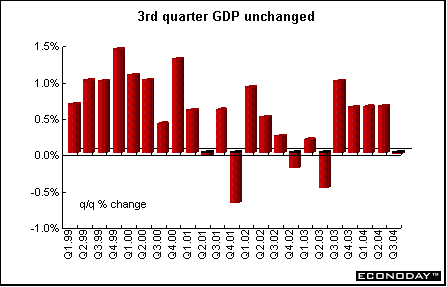
Britain - December Halifax house price survey was up 1.1 percent. For the three months ending in December, prices were up 15.1 percent when compared with the same three months in 2003. These data differ from the Nationwide house price survey. That index declined by 0.2 percent in December.
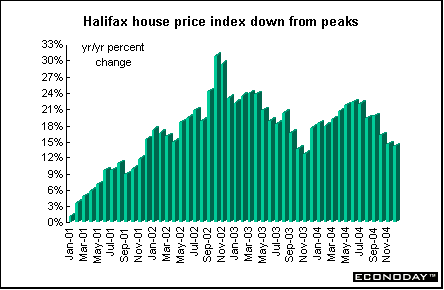
Asia
Australia - November retail sales increased 0.1 percent following a 1 percent decline in October. Sales were up 1.9 percent when compared with last year. Food sales were up 0.5 percent and purchases of household goods gained 1.3 percent. Spending at department stores declined 1.6 percent in November and sales at clothing stores fell 0.8 percent.
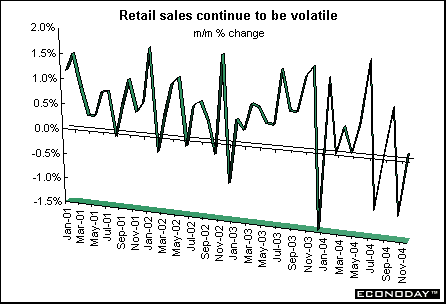
Americas
Canada - November industrial product price index (IPPI) dropped 1.7 percent but was up 4.1 percent when compared with last year. Lower prices for motor vehicles, petroleum, lumber, as well as pulp and paper products were the main sources of the monthly decline. Motor vehicle and other transport equipment prices declined 2.8 percent, mainly because of a stronger Canadian dollar. Petroleum and coal products prices decreased as gasoline and fuel oil prices dropped 4.7 percent. On the year, prices for petroleum and coal products continued to have a major influence, soaring 36.9 percent. If petroleum and coal product prices had been excluded, the IPPI would have increased only 1.8 percent.
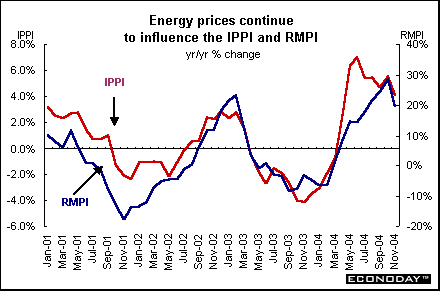
November raw materials price index (RMPI) sank 5.3 percent but was up 19.7 percent when compared with last year. There were price declines in mineral fuels, wood products, vegetable products, animals and animal products, and ferrous materials. Crude oil prices declined 10.8 percent due to higher inventories and increased production.
Between October and November, the value of the Canadian dollar strengthened by 4.2 percent against the U.S. dollar. If the impact of the exchange rate had been excluded, the IPPI would have fallen 0.6 percent rather than the actual 1.7 percent decline. On a 12-month basis, if the impact of the exchange rate had been excluded, producer prices would have risen 6.5 percent rather than their actual 4.1 percent increase.
December employment jumped an estimated 33,500 jobs. The unemployment rate dropped from 7.3 percent in November to 7 percent - the lowest rate since May 2001. All of the gains were in full time jobs. Full time employment was up by 41,200 while part time jobs declined by 7,800. Employment increased by 15,000 in professional, scientific and technical services, and by 7,000 in natural resources. But employment in retail and wholesale trade was down by 20,000.
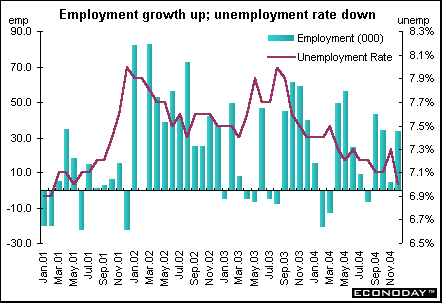
Bottom line
Topic A for this week is whether the U.S. dollar will continue to rise against virtually all other currencies. While many analysts think that last week's adjustment was merely offsetting the rather steep and rapid declines during the holiday season, there are others who believe that the dollar hit its nadir and is now ready to climb. In reality, very little has changed other than the year. The same problems that drove the value of the dollar down still exist despite earnest rhetoric from the administration to rectify the deficits. That the Fed will undoubtedly continue to push interest rates upwards will eventually give the U.S. an advantage over Europe on interest rates.
The European Central Bank and the Bank of England are slated to meet this week. No change in interest rates is expected. The Reserve Bank of Australia traditionally does not meet in January - it is their summer holiday.
With the New Year, Britain is now the chair of the Group of Seven/Eight. Luxembourg has taken over the revolving presidency of the European Union for the next six months.
Looking Ahead: January 10 through January 15, 2005
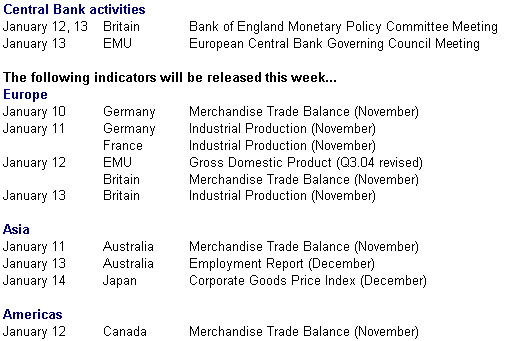


|

